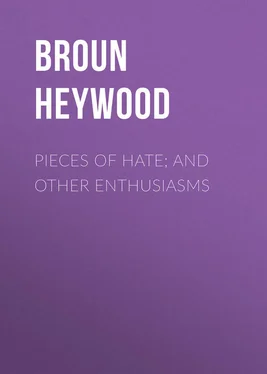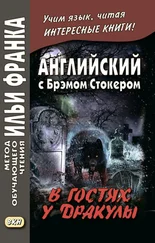Heywood Broun - Pieces of Hate; And Other Enthusiasms
Здесь есть возможность читать онлайн «Heywood Broun - Pieces of Hate; And Other Enthusiasms» — ознакомительный отрывок электронной книги совершенно бесплатно, а после прочтения отрывка купить полную версию. В некоторых случаях можно слушать аудио, скачать через торрент в формате fb2 и присутствует краткое содержание. Жанр: foreign_antique, foreign_prose, foreign_language, на английском языке. Описание произведения, (предисловие) а так же отзывы посетителей доступны на портале библиотеки ЛибКат.
- Название:Pieces of Hate; And Other Enthusiasms
- Автор:
- Жанр:
- Год:неизвестен
- ISBN:нет данных
- Рейтинг книги:5 / 5. Голосов: 1
-
Избранное:Добавить в избранное
- Отзывы:
-
Ваша оценка:
- 100
- 1
- 2
- 3
- 4
- 5
Pieces of Hate; And Other Enthusiasms: краткое содержание, описание и аннотация
Предлагаем к чтению аннотацию, описание, краткое содержание или предисловие (зависит от того, что написал сам автор книги «Pieces of Hate; And Other Enthusiasms»). Если вы не нашли необходимую информацию о книге — напишите в комментариях, мы постараемся отыскать её.
Pieces of Hate; And Other Enthusiasms — читать онлайн ознакомительный отрывок
Ниже представлен текст книги, разбитый по страницам. Система сохранения места последней прочитанной страницы, позволяет с удобством читать онлайн бесплатно книгу «Pieces of Hate; And Other Enthusiasms», без необходимости каждый раз заново искать на чём Вы остановились. Поставьте закладку, и сможете в любой момент перейти на страницу, на которой закончили чтение.
Интервал:
Закладка:
The professor remains at bat during good behavior. He is not subject to any such sudden vicissitudes as Ruth. Moreover, timber physics is to Mr. Roth a matter of cool and calm deliberation. No adversary seeks to fool him with speed or spitballs. "Hit it out" never rings in his ears. And after all, just what difference does it make if Mr. Roth errs in his timber physics? It merely means that a certain number of students leave Michigan knowing a little less than they should – and nobody expects anything else from students.
On the other hand, a miscalculation by Ruth in the uses of wood affects much more important matters. A strike-out on his part may bring about complete tragedy and the direst misfortune. There have been occasions, and we fear that there will still be occasions, when Ruth's bat will be the only thing which stands between us and the loss of the American League pennant. In times like these who cares about "Forest Conditions in Wisconsin"?
Coming to the final summing up for our side of the question at debate, we shall try to lift the whole affair above any mere Ruth versus Roth issue. It will be our endeavor to show that not only has Babe Ruth been a profound interest and influence in America, but that on the whole he has been a power for progress. Ruth has helped to make life a little more gallant. He has set before us an example of a man who tries each minute for all or nothing. When he is not knocking home runs he is generally striking out, and isn't there more glory in fanning in an effort to put the ball over the fence than in prolonging a little life by playing safe?
VIII
THE BIGGER THE YEAR
As soon as we heard that "The Big Year – A College Story" by Meade Minnigerode was about Yale we knew that we just had to read it. Tales of travel and curious native customs have always fascinated us. According to Mr. Minnigerode the men of Yale walk about their campus in big blue sweaters with "Y's" on them, smoking pipes and singing college songs under the windows of one another. The seniors, he informs us, come out on summer afternoons on roller skates.
Of course, we are disposed to believe that Mr. Minnigerode, like all travelers in strange lands, is prone to color things a little more highly than exact accuracy would sanction. We felt this particularly when he began to write about Yale football. There was, for instance, Curly Corliss, the captain of the eleven, who is described as "starting off after a punt to tear back through a broken field, thirty and forty yards at a clip, tackling an opposing back with a deadliness which was final – never hurt, always smiling – a blond head of curly hair (he never wore a headguard) flashing in and out across the field, the hands clapping together, the plaintive voice calling 'All right, all right, give me the ball!' when a game was going badly, and then carrying it alone to touchdown after touchdown."
Although we have seen all of Yale's recent big games we recognized none of that except "the plaintive voice" and even that would have been more familiar if it had been used to say "Moral victory!" We waited to find Mr. Minnigerode explaining that of course he was referring to the annual contest with the Springfield Training School, but he did no such thing and went straight ahead with the pretense that football at Yale is romantic. To be sure, he attempts to justify this attitude by letting us see a good deal of the gridiron doings through the eyes of a bull terrier who could not well be expected to be captious. Champ, named after the Yale chess team, came by accident to the field just as Curly Corliss was off on one of his long runs. Yes, it was a game against the scrubs. "Some one came tearing along and lunged at Curly as he went by, apparently trying to grab him about the legs. Champ cast all caution to the winds. Interfere with Curly, would he? Well, Champ guessed not! Like an arrow from a bow Champ hurled himself through the air and fastened his jaws firmly in the seat of the offender's pants, in a desperate effort to prevent him from further molesting Curly."
Champ was immediately adopted by the team as mascot. It seems to us he deserved more, for this was the first decent piece of interference seen on Yale field in years. The associate mascot was Jimmy, a little newsboy, who also took football at New Haven seriously. His romanticism, like that of Champ, was understandable. Hadn't Curly Corliss once saved his life? We need not tell you that he had. "Jimmy," as Mr. Minnigerode tells the story, "started to run across the street, without noticing the street-car lumbering around the corner… and then before he knew it Jimmy tripped and fell, and the car was almost on top of him grinding its brakes. Jimmy never knew exactly what happened in the next few seconds, but he heard people shouting, and then something struck him and he was dragged violently away by the seat of the pants. When he could think connectedly again he was sitting on the curb considerably battered – and Curly was sitting beside him, with his trousers torn, nursing a badly cut hand."
We remember there was an incident like that in Cambridge once, only the man who rescued the newsboy was not the football captain but a substitute on the second team. We have forgotten his name. Unlike Corliss of Yale, the Harvard man did not bother to pick up the newsboy. Instead he seized the street car and threw it for a loss.
The first half was over and Princeton led by a score of 10 to 0. Things looked blue for Yale. Neither mascot was on hand. Yale was trying to win with nothing but students. Where was little Jimmy the newsboy? If you must know he was in the hospital, for he had been run over again. The boy could not seem to break himself of the habit. Unfortunately he had picked out the afternoon of the Princeton game when all the Yale players were much too busy trying to stop Tigers to have any time to interfere with traffic. It was only an automobile this time and Jimmy escaped with a mere gash over one eye. Champ, the bull terrier who caused the mixup, was uninjured. "I'm all right now," Jimmy told the doctor, "honest I am – can I go – I gotta take Champ out to the game – he's the mascot and they can't win without him – please, Mister, let me go – I guess they need us bad out there."
Apparently the crying need of Yale football is not so much a coaching system as a good leash to keep the mascots from getting run over. Champ and Jimmy rushed into the locker room just as the big Blue team was about to trot out for the second half. After that there was nothing to it. Yale won by a score of 12 to 10. "Curly clapped his hands together," writes Mr. Minnigerode in describing the rally, "and kept calling out 'Never mind the signal! Give me the ball' in his plaintive voice" —
This sounds more like Yale football than anything else in the book. However, it sufficed. Curly made two touchdowns and all the Yale men went to Mory's and sang "Curly Corliss, Curly Corliss, he will leave old Harvard scoreless." It is said that a legend is now gaining ground in New Haven that Yale will not defeat Harvard again until it is led by some other captain whose name rhymes with "scoreless." The current captain of the Elis is named Jordan. The only thing that rhymes with is "scored on."
Still, as Professor Billy Phelps has taught his students to say, football isn't everything. Perhaps something of Sparta has gone from Yale, for a few years or forever, but just look at the Yale poets and novelists all over the place. There is a new kindliness at New Haven. Take for instance the testimony of the same "Big Year" when it describes a touching little scene between Curly Corliss, the captain of the Yale football team, and his room mate as they are revealed in the act of retiring for the night:
"'Angel!'
"'Yeah,' very sleepily.
Читать дальшеИнтервал:
Закладка:
Похожие книги на «Pieces of Hate; And Other Enthusiasms»
Представляем Вашему вниманию похожие книги на «Pieces of Hate; And Other Enthusiasms» списком для выбора. Мы отобрали схожую по названию и смыслу литературу в надежде предоставить читателям больше вариантов отыскать новые, интересные, ещё непрочитанные произведения.
Обсуждение, отзывы о книге «Pieces of Hate; And Other Enthusiasms» и просто собственные мнения читателей. Оставьте ваши комментарии, напишите, что Вы думаете о произведении, его смысле или главных героях. Укажите что конкретно понравилось, а что нет, и почему Вы так считаете.












